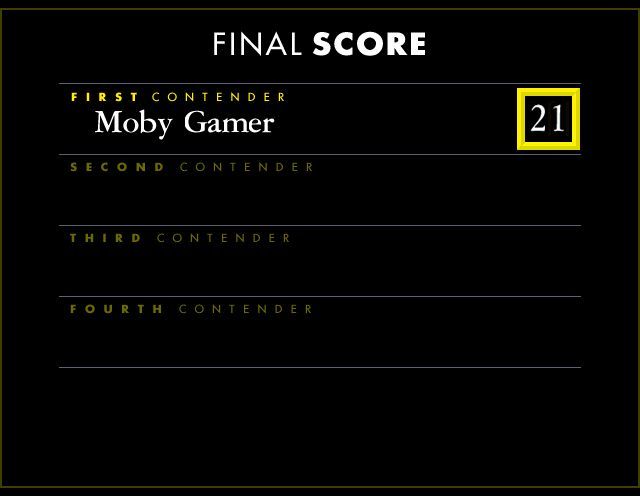Retro Replay Review
Gameplay
Mastermind faithfully captures the suspense and precision of its television namesake. Players begin by choosing from one of 50 specialized categories—ranging from classical composers to modern cinema—before stepping into the black chair. Once in position, a two-minute clock begins, and you must answer as many questions as you can within the time limit. Questions may be passed or skipped, allowing you to skip a tough item in order to tackle higher-yield queries before the buzzer sounds.
(HEY YOU!! We hope you enjoy! We try not to run ads. So basically, this is a very expensive hobby running this site. Please consider joining us for updates, forums, and more. Network w/ us to make some cash or friends while retro gaming, and you can win some free retro games for posting. Okay, carry on 👍)
After the specialist round, the format shifts to a general knowledge blitz under the same time pressure. This two-tiered approach highlights both breadth and depth of knowledge: your mastery of a single field determines if you can gain an early lead, while your overall trivia prowess can make or break your final standing. The tension ramps up when you realize that every second—and every pass—can influence the outcome.
Multiplayer support for up to four contestants raises the stakes further. Whether you’re competing against friends locally or tackling AI opponents of varying difficulty, the competition remains fierce. If two players tie on correct answers, the one with more passes is eliminated, and if they’re still neck and neck, a sudden-death tie-breaker of five identical questions decides who advances. These built-in tie-resolution rules add an extra layer of strategy: sometimes it’s smarter to pass fewer questions and risk tougher queries later on.
With a database of over 5,000 questions and continuously randomized draws, Mastermind delivers strong replay value. Each playthrough feels fresh thanks to the breadth of categories and unpredictable question pool. Whether you’re a trivia novice or a seasoned quizzer, the game adapts by offering an appropriate challenge level, making it a staple for quiz nights and solitary practice alike.
Graphics
While Mastermind isn’t a showcase of cutting-edge visuals, its presentation is clean, clear, and true to the feel of the televised version. The interface replicates the iconic black chair and spotlight setup, complete with simple 3D models and subtle lighting effects to break up the flat backgrounds. On modern displays, text and timers remain razor-sharp, ensuring you never miss a crucial second ticking away.
The host, Magnus Magnusson, is rendered as a tasteful silhouette and appears in pre-recorded video sequences to deliver question prompts and catchphrases. Though slightly pixelated by today’s standards, his “I’ve started so I’ll finish” line retains its charm and nostalgia. Animations are minimal—primarily limited to spotlight fades and smooth camera pans—but they never distract from the trivia action.
Menus and category selections are laid out in an intuitive grid format, with clear icons representing each field of expertise. The color palette leans on high-contrast whites and blacks, punctuated by vibrant accent hues when you pass a question or lock in an answer. In short, the graphics may be functional rather than flashy, but they serve the gameplay superbly.
Story
Mastermind doesn’t follow a traditional narrative, but it weaves an authentic quiz-show atmosphere through every round. Your journey begins with the suspense of the specialist questions, builds into a tense general knowledge sprint, and often culminates in the adrenaline of a tie-break. The “story” here is entirely emergent—each contestant’s rise and fall is written in real time by the accuracy of their answers.
The presence of Magnus Magnusson himself serves as the only true “plot device,” tying the game back to its heritage. His measured tone and signature lines punctuate the gameplay, providing a connective thread between virtual play and televised tradition. Every time he utters “I’ve started so I’ll finish,” you’re reminded of the show’s storied past, and you feel the weight of his impartial judgment.
Even without character arcs or narrative branches, Mastermind cultivates a narrative of personal challenge. You’ll find yourself recalling past mistakes, honing strategies for passing or tackling tough questions, and setting goals for beating your own high score—or that of your friends. In its own way, the game’s “story” unfolds with each buzzer-beat reveal of right or wrong answers.
Overall Experience
Mastermind stands out as an engaging, cerebral experience that will appeal most to trivia enthusiasts and fans of competitive quiz shows. Its faithful adaptation of the classic format, complete with authentic host segments and a comprehensive question bank, ensures that every match feels like a genuine broadcast episode. The pacing is brisk, and the strategic choice of when to pass or answer injects an element of resource management into what might otherwise be a simple Q&A routine.
Though the graphics and sound design remain modest by modern standards, these limitations do little to hamper enjoyment. The focus is squarely on content, and with over 5,000 questions across a wide variety of topics, you’ll rarely encounter repeats. Multiplayer sessions spark lively rivalries, and solo play provides an excellent training ground for budding quiz masters looking to sharpen their reflexes and recall.
Ultimately, Mastermind offers a polished, no-frills trivia experience that rewards both knowledge and quick thinking. Whether you want to recreate the thrill of the television show or simply test yourself against a broad spectrum of questions, this adaptation delivers. It’s a must-have for anyone who lives for lightning-fast buzzer rounds and the satisfaction of nailing that final, game-deciding question.
 Retro Replay Retro Replay gaming reviews, news, emulation, geek stuff and more!
Retro Replay Retro Replay gaming reviews, news, emulation, geek stuff and more!









Reviews
There are no reviews yet.